Chris & Allyson vs. Europe (2013)
The Swiss Affair: Zurichfest. Journey to Jungfraujoch. The Dolder Grand. Zurich's Old Town. Lucerne attractions. Lake Lucerne.
The train pulled into Zurich around 3 p.m. It had been a pleasant ride -- along the Rhine, past farms and castles, cutting through centuries of history. The train was operating with the trademark Germanic efficiency that could be either wondrous or chilling. They spent their time sleeping, or in idle conversation. They thumbed through a guidebook and mentally rehearsed the days ahead. Switzerland was clean, orderly and polite. Their adventures would be, too.
It was therefore curious to hear music thumping through the train station; to walk through the garbage strewn across the platform; to see pierced and dyed travelers all around them. "Something is strange," he said. She agreed.
That something was Zurichfest. Every third year, the people of Zurich abandon their mechanical existence for a weekend. Medieval plazas become dance floors. Beer and wine are freely spilled on cobblestone streets. History is pushed aside for Ferris wheels, sausage stands, and fat men in brass bands. Zurich becomes the un-Zurich. A quick re-thumbing confirmed that this was not in the guidebook.
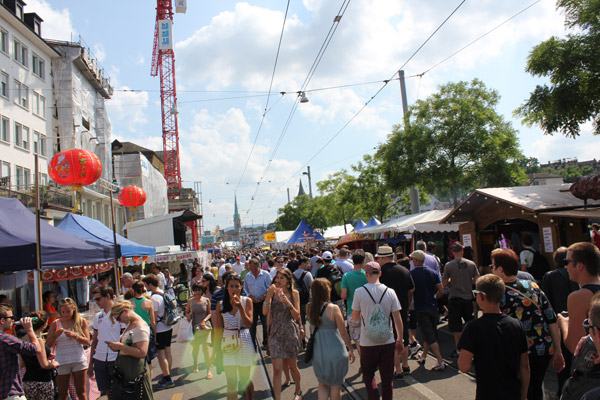
Crowds descend on Zurich for the madness of Zurichfest.
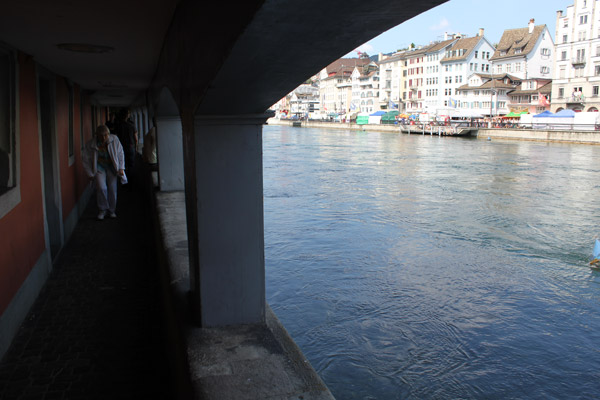
A stroll along the Limmat River.
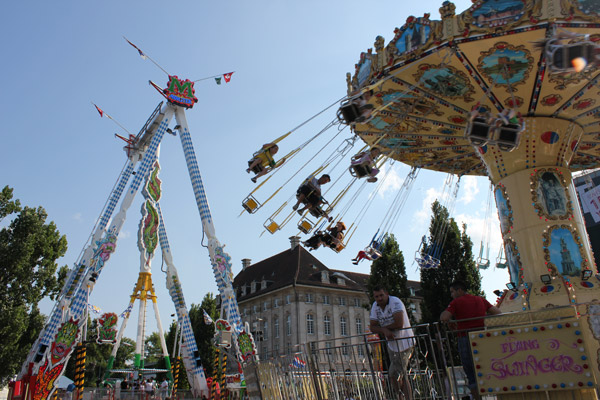
Downtown Zurich, transformed into an amusement park for Zurichfest.
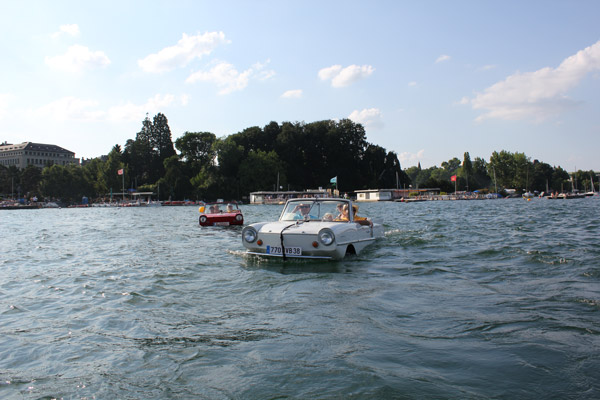
Experiencing Lake Zurich in a most unusual way.
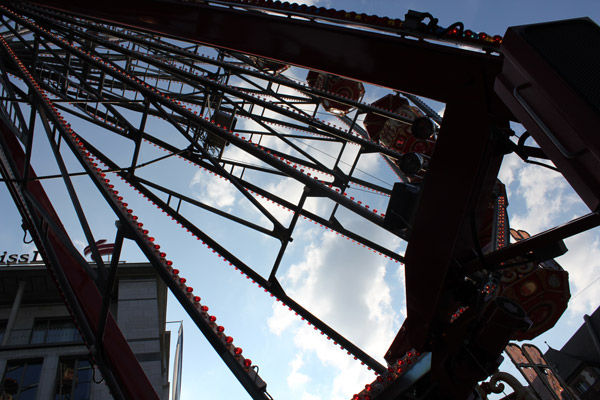
Wheel in the sky keep on turnin'.
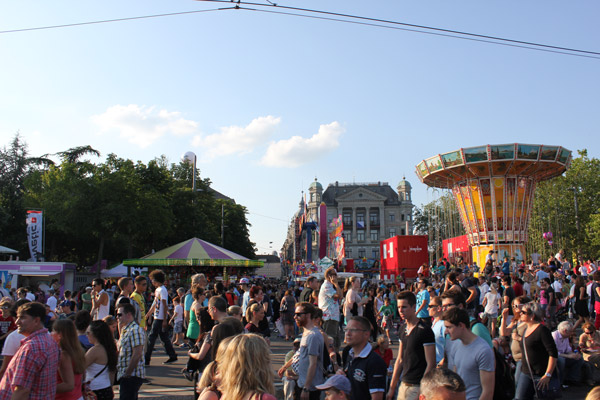
Zurichfest turns out a huge crowd.
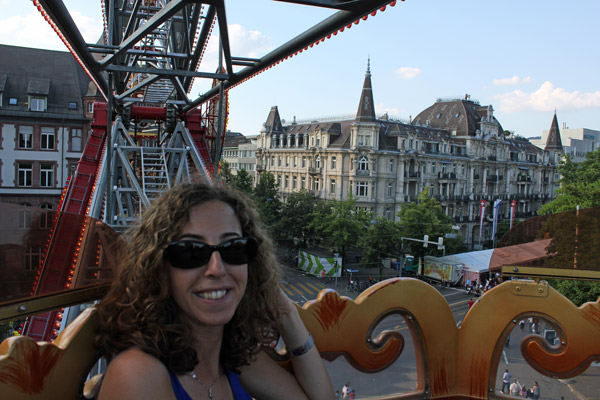
The view from the Ferris wheel. History AND amusement? Wow!
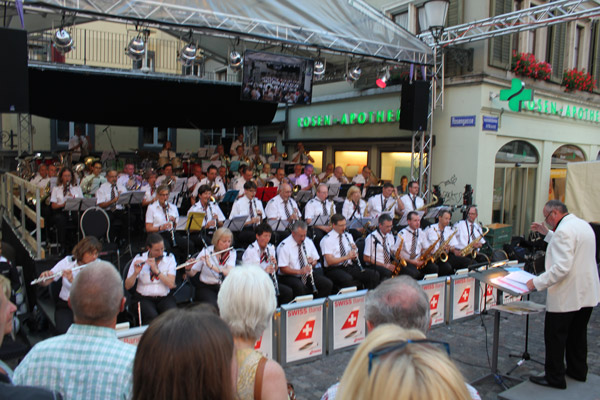
Music, crammed into every corner of a medieval city.
The travelers chose to treat this discovery as a pleasant surprise. They rolled their luggage over the cobblestones and across the Limmat River. Their nearby hotel was of the "art" variety, with graffiti on the walls of the room. Another weekend, it would have been a splash of chaos on Zurich's orderly canvass. This weekend, it was a conservative change of pace from the outside.
Most of the plans made on the train were gone, swept away in a tide of American pop music, swarming teenagers and day-drinking white trash -- those doubting the brotherhood of man should realize that street festivals are the same, no matter where they're held. But their idea for lunch held, and they forded the crowd to find a vegetarian buffet. Full of non-threatening plant matter, the travelers headed for the water.
The travelers had seen better lakes. Lake Zurich starts where the Linth River enters a banana-shaped valley; it curves west and north before exiting the valley through the Limmat, 25 miles later. Zurich straddles the exit and the surrounding hillsides. One shore is almost always visible from the opposite shore. It is not a great highway of commerce or industry. But the water is clear, clean, and pleasant. The beaches are well-kept and public. And it seemed like a place for a festival.
Instead of touring Zurich's past, they toured the midway. Daredevil motorcyclists performed stunts, riding bikes more finely tuned than a Swiss watch. Acrobats twisted themselves into better positions to accept tips. A Ferris wheel -- America's great contribution to the machinery of fun -- spun its riders to the rooftops. And there were aquacars: A fleet of four-wheeled boats, ferrying passengers in broad loops around the lake. It was an expensive ticket, but after some deliberation, they took the plunge. Because how often do you get to have a man from Dusseldorf drive you into a Swiss lake in a Jeep?
They bobbed through the crowd for the remains of the day, eating and drinking as needed. The evening closed with fireworks. There were snippets of music, carving out cantons for different styles: a polka cover of "Sweet Caroline"; thumping European dance beats; doo-wop hits; "Rappers Delight." Their hotel offered no defense from the noise, and even with the memories it had provided them, by 3 a.m. they came to curse the name of Zurichfest. As they staggered from their beds the next morning, they rued the oompah bands and street vendors. As they trudged to the bus station -- behind the train station -- they spat on the very notions of facepainting and fireworks.
She felt distinctly ill as they boarded the bus, no doubt infected by the enthusiastic germs that the festival had brought to the Petri-dish city. The malaise persisted as the bus took them along the highways and winding roads, toward the heart of Switzerland.
At Interlaken, Switzerland started to work its magic. Across all centuries and all continents, people have sought "the air" and the "the waters" as remedies for their ailments. Switzerland's air floats above the worries of everyday continental life. Its waters come straight from its mountains, tainted only by the sediments one finds at 14,000 feet above sea level. Its cheese and chocolate can quickly undo the benefits of the air and the waters, but she was not the type to indulge in either. They stretched their legs at the town between the lakes; standing in a green field, they marveled at the peaks of the Bernese Oberland and watched in idle curiosity as paragliders circled overhead. Because they air and waters were improving her health, there was no need to avail themselves of the recuperative powers of the Interlaken Hooters.
People have also sought strength from other people. Her vigor returned as they listened to Kie, their exceptionally loud tour guide. He was vaguely Asian, and possibly Filipino. He rolled his Rs with unforgettable panache. It was not clear how a possibly Filipino man wound up leading tours in central Switzerland, but with their minds fatigued from Zurichfest, they did not press for the answer.
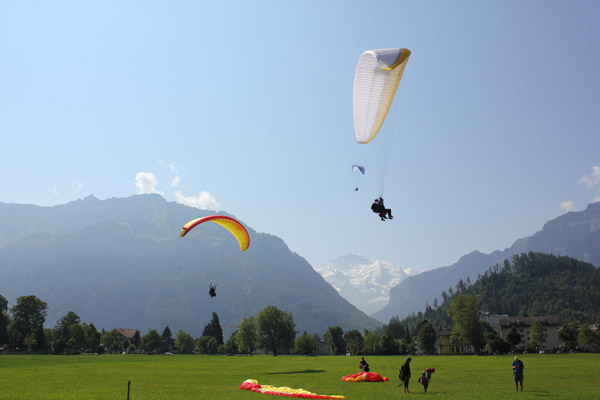
Skydivers land (really) outside a Hooters.
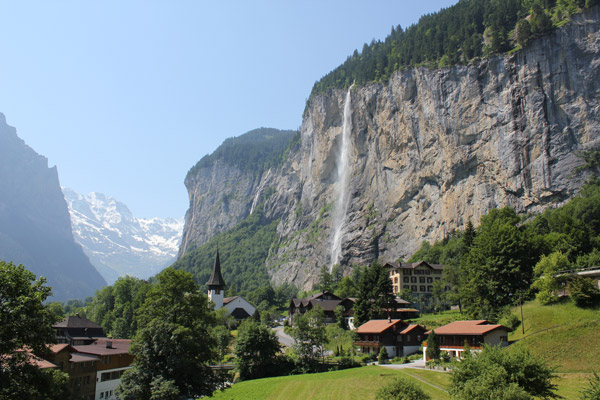
A standard vista in the Bernese Oberland.
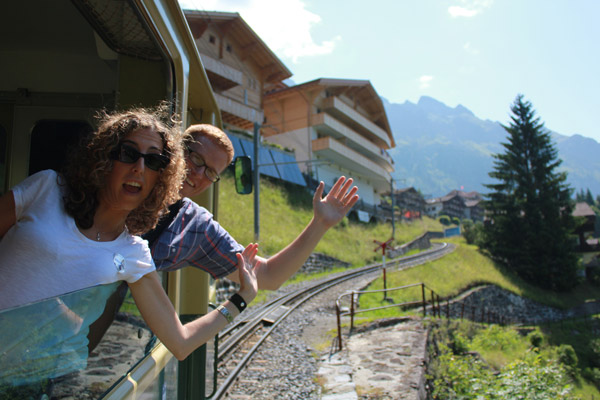
Let it ride.
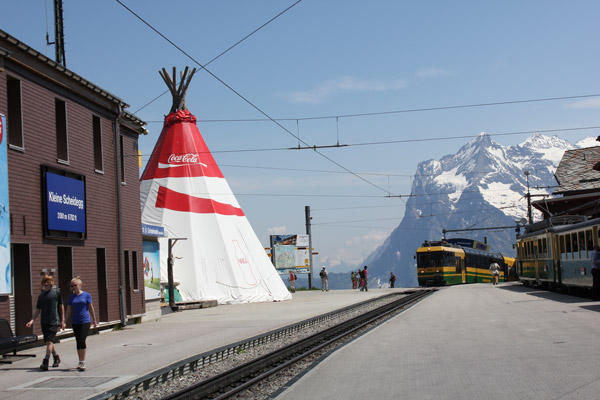
Station to station. En route to Jungfraujoch.
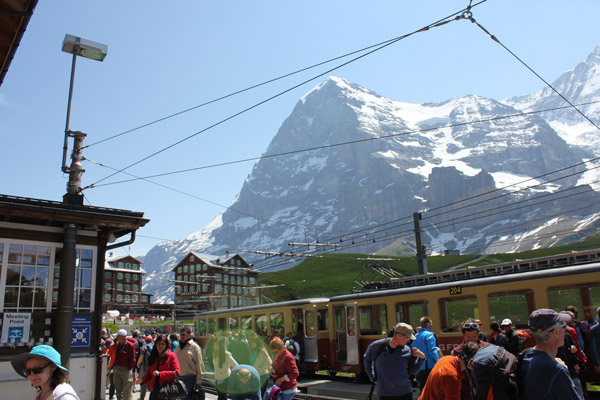
The Eiger looms above.
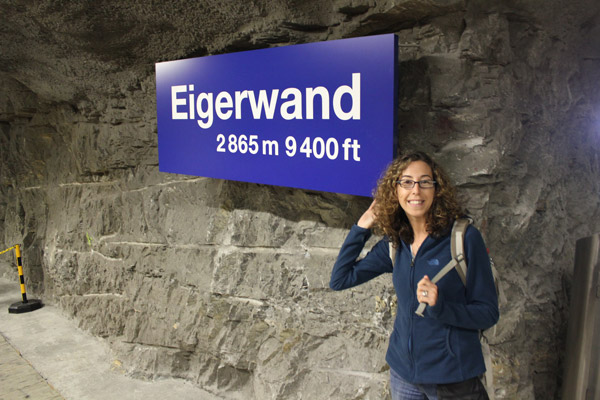
Train tracks inside the mountain.
Upon boarding their first train into the mountains, they settled into conversation with Dheera and Tanuj, an Indian couple by way of Atlanta. They were "Medicare providers" who had settled in the United States in 1999, and self-professed foodies. The conversation was light and pleasant. It was the chatter of people who could enjoy each other's company with no expectation of ever speaking again -- as though meeting an Indian couple from Atlanta on a Swiss mountainside was a perfectly natural thing.
The chatter was rivaled only by the scenery. The travelers were heading upward, to the "Top of Europe": Jungfraujoch. It is a mountain, of which Switzerland has many. It is a nice mountain, as far as mountains go. It is tall (11,000 feet), snowy and craggy, like a good Swiss mountain should be. But it is not the greatest mountain in Europe. There are higher peaks, and more striking peaks, and more famous peaks. The neighboring Eiger, for example, is a killer of men -- a proving ground where the human spirit is regularly defeated by uncaring rock.
The greatness of Jungfraujoch, therefore, is in its accessibility. Rails run up and through the mountains -- those who cannot climb the Eiger may still ride inside it -- taking even the most timid souls to 11,000 feet above sea level with very little effort. The travelers were timid, at least when it came to mountaineering. A few years before, they had seen a movie about people climbing the Eiger. It hadn't ended well. They became aware of the altitude as they reached the middle of that mountain. It made them secure in their decision not to experience the Bernese Oberland by climbing.
But there were still experiences to be had at the top. Their guide ran them efficiently through the highlights: An observation platform, an "ice palace," and a plateau for those who wished to tromp through the snow. They experienced winter in the summer, then sat down with their Indian acquaintances for a cafeteria lunch. It was a first-rate tourist experience, for travelers who felt no shame in being tourists. They rested quite well on the ride home, with the requisite tourist conversations. They swapped histories with New Zealand dairy farmers, and a mechanical engineer from Utah. All types converged at the top.
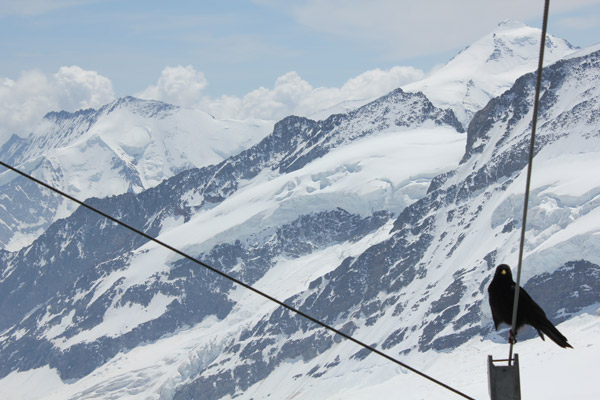
Top of the world, caw. A view from Jungfraujoch.
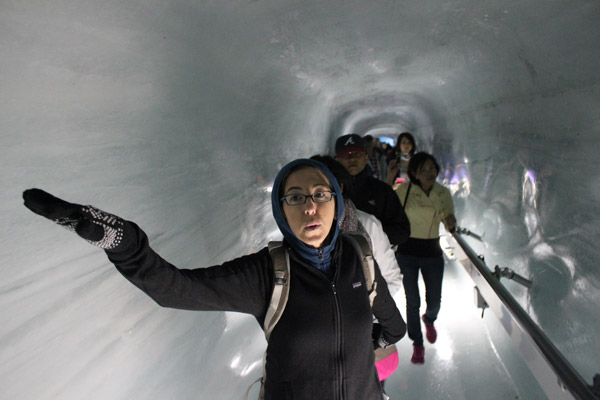
Inside the ice tunnels of Jungfraujoch.
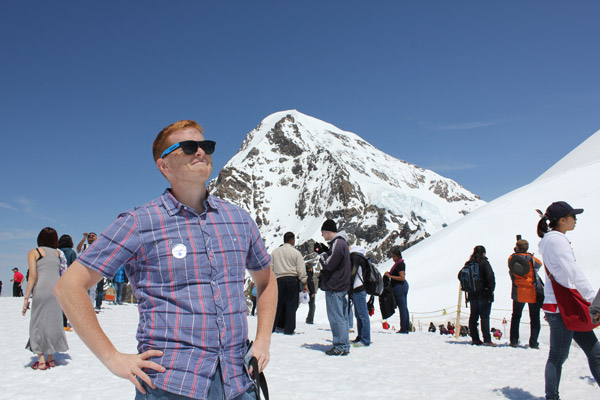
Cold AND cool.
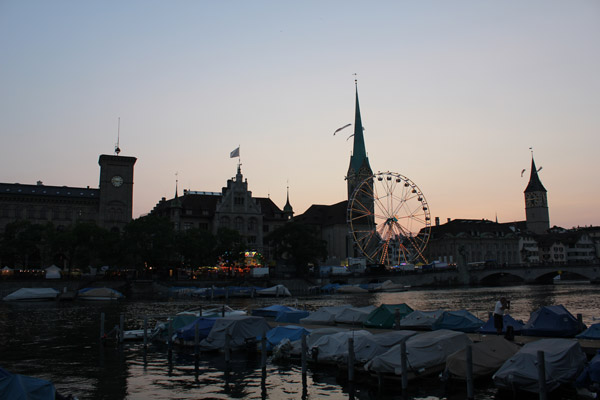
The remains of Zurichfest.
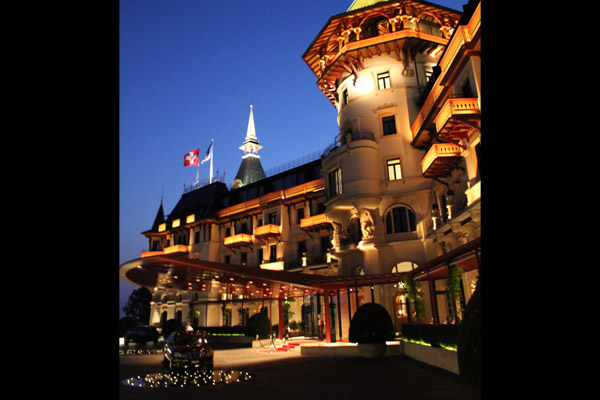
A visit to the Dolder Grand.
They returned to Zurich and the decaying remains of Zurichfest. The DJs had dispersed, and the bands no longer oompahed. Carnival rides patiently awaited their dismemberment, and no cars cruised the placid surface of Lake Zurich. The travelers took in dinner, then set off on foot to meet their Indian acquaintances. The couple was staying at the Dolder Grand, a decadent hotel on one of Zurich's higher hills. Though they had been to the top of the mountain, this was their climbing for the day. They ascended through the neighborhoods, over cobblestone streets and into the night. It was a fairytale hotel, with needless spires and gaudy luxury. They chatted awhile longer with their acquaintances -- whom they would never see again -- before taking a cab back to their hotel.
The next day was devoted to Zurich. As the festival evaporated, the city they had planned to see emerged. Upon awakening, he embarked on a morning jog. At his pace, it was less about fitness and more about exploration. He found a beach on the east side of the lake, and when she was ready, they walked there. There were green lawns, and statues, and ducks, and swans. There were changing rooms, and diving boards, and water slides, and sun decks. He swam in the water while she politely refused; it was cold and clear and suspiciously (by American standards) refreshing.
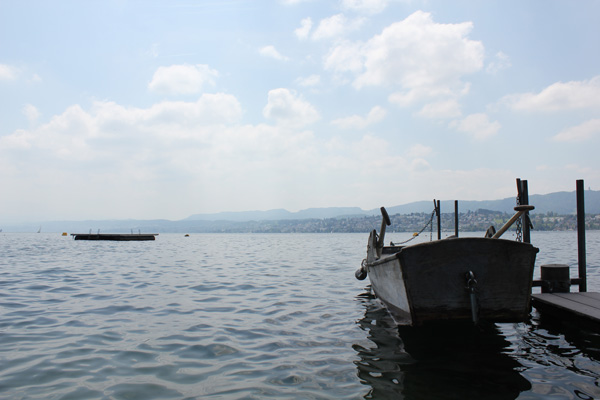
Going for a swim in Lake Zurich.
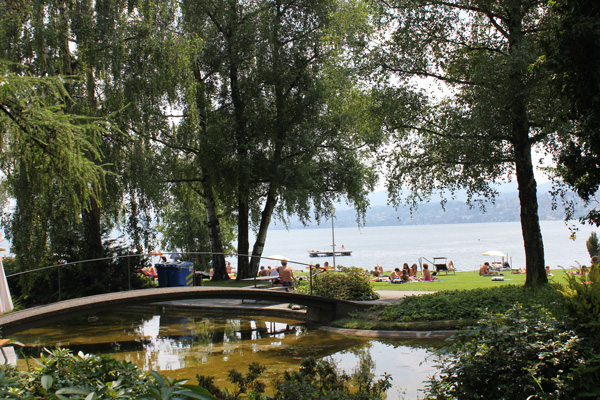
The very pleasant city park on the shore of Lake Zurich.
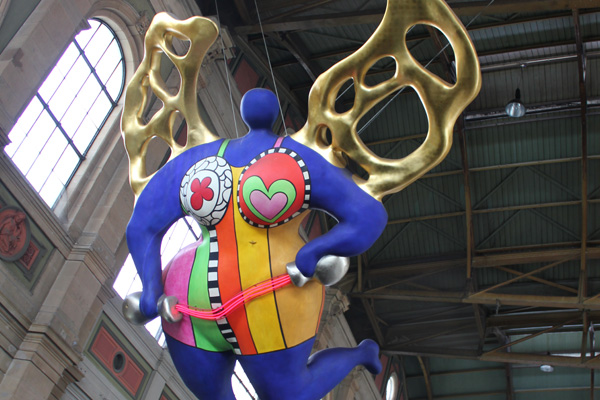
Art hanging in the Zurich train station.
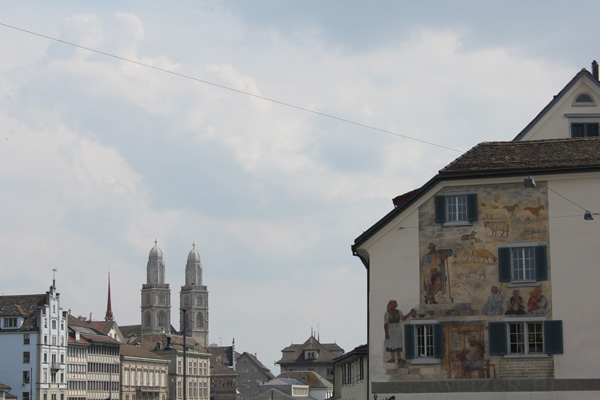
A walking tour of Old Town Zurich.
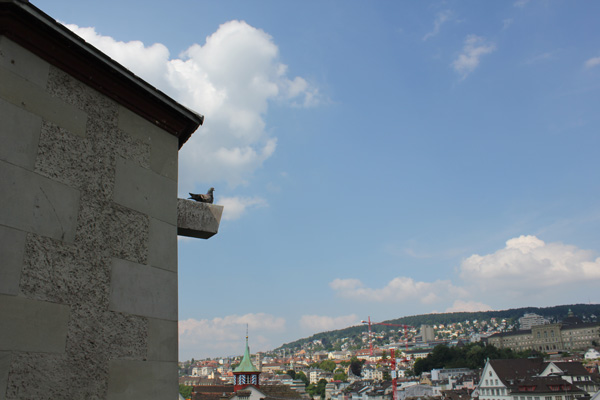
A bird's eye view of the city.
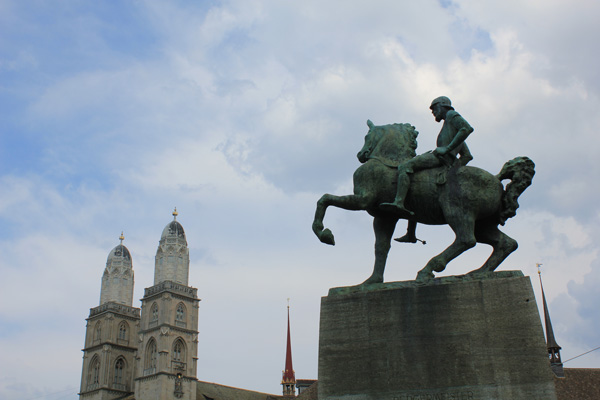
The twin towers of the Grossmunster.
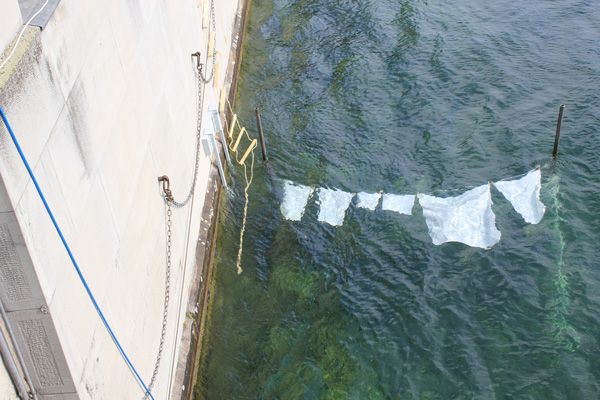
When laundry goes terribly, terribly wrong.
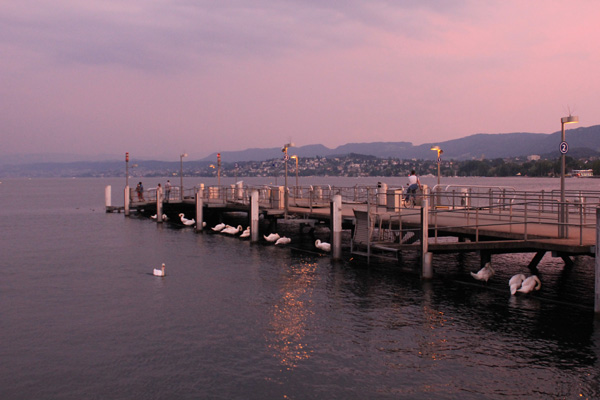
Lake Zurich at sunset.
That afternoon, they enlisted in an Old Town walking tour. They learned about the city's founders, and its patron saints, and the Romans. They were told about the city walls and their demolition. They were told about Charlemagne and the city's cathedrals and guildhalls. It was wonderful information that had no chance of being absorbed. Within days, the knowledge had evaporated like the mist on a Swiss lake. They sat that evening on the steps of the opera house, discussing communism for some reason. It felt like the European thing to do.
When you have discussed the very nature of society on the steps of a city's opera house, there is little more that the city can offer you. The travelers, facing their final day in Switzerland, chose to explore yet again. The city of Lucerne was nearby, and it had inspired some of the cheese they regularly purchased in their American grocery stores. The 9:04 train took them there with Swiss precision.
Precision can lead to familiarity, so Lucerne had the feel of Zurich. The travelers headed first to the Chapel Bridge, a scenic path across a lake, to nowhere in particular. The illuminated panels on its walkway had been destroyed by fire not 20 years before, but history leaves deeper scars than flame. Restored at great expense, the panels still captivated the milling crowds. They drifted to the Lion Monument, a tribute to employee loyalty. Defending the Frenchman who signed their paychecks, the Swiss Guards of Louis XVI were not spared by the revolutionaries. Men have died for nobler causes, but few have been honored more nobly; in a neutral nation, glory is a scarce thing. A wounded lion was carved into a cliff face, above a greenish pool. Twain called it "the most mournful and moving piece of stone in the world." He did not have to tussle with a large Spanish tour group, however. The travelers, who did, absorbed it quickly and moved to the tourist trap next door.
Glacier Garden, a well-worn collection of glacial "potholes" in the middle of the city, tells the geological history of Switzerland. When smooth rocks no longer justified the price of admission, its owners added a model chalet, and a rabbit warren, and an observation tower, and a hall of mirrors with Moorish décor. A nearby panorama showed the Swiss aiding a defeated French army in the 1870s. These attractions were more than a century old. Those who sneer at Americans as an unsophisticated lot forget that it is a nation rife with European immigrants.
They left Lucerne at 12:10 in pursuit of greater history, both natural and unnatural. Lake Lucerne was the supreme pothole; its shrines guarded the origins of the Swiss people. The travelers boarded the ferry to Fluelen. Their rail pass, for the afternoon at least, extended their first-class privileges to the water. They were not first-class people -- he wore cargo shorts and t-shirt, while she wore a tank top -- but no one minded the incongruecy. They had a normal lunch at first-class prices, while floating south and east on blue mountain waters.
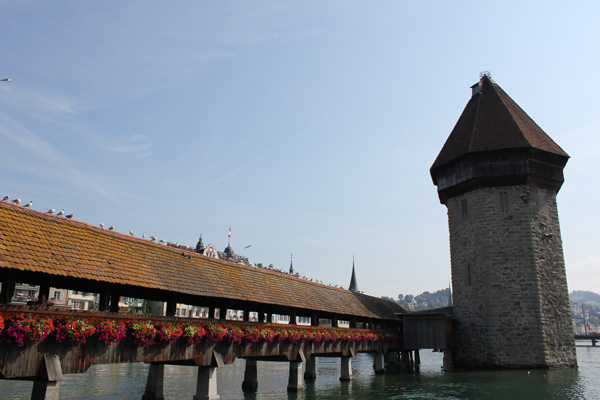
Chapel Bridge in beautiful Lucerne.
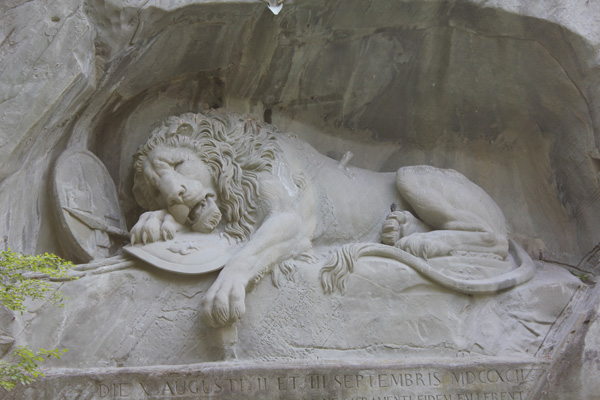
The mournful Lion Monument.
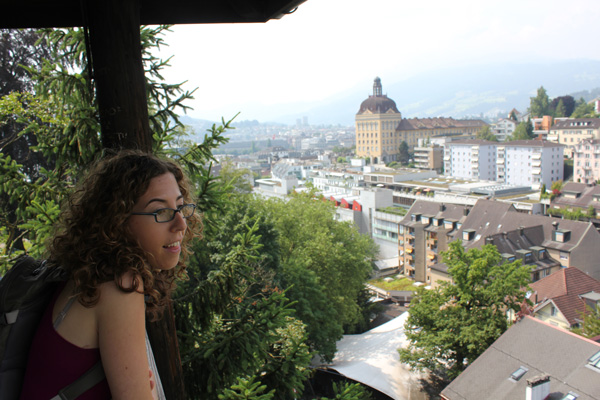
The skyline of historic Lucerne.
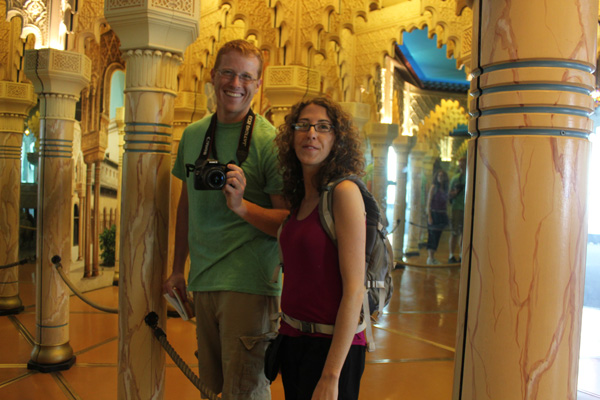
Inside the hall of mirrors at the Glacier Garden in Lucerne.
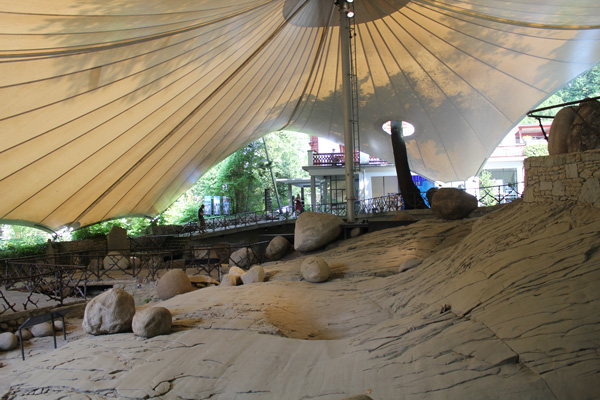
Keep on rocking. Lucerne's Glacier Garden.
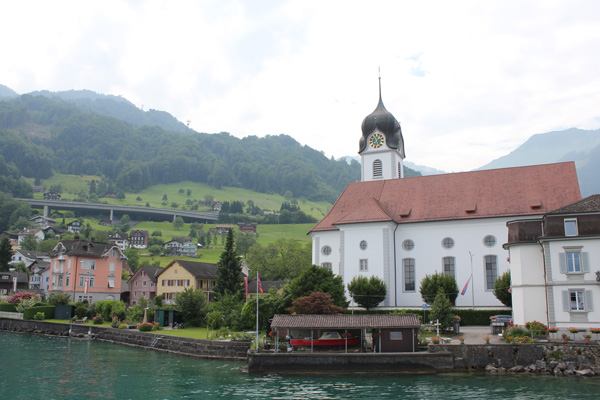
A typical scenic dock on the Lake Lucerne ferry route.
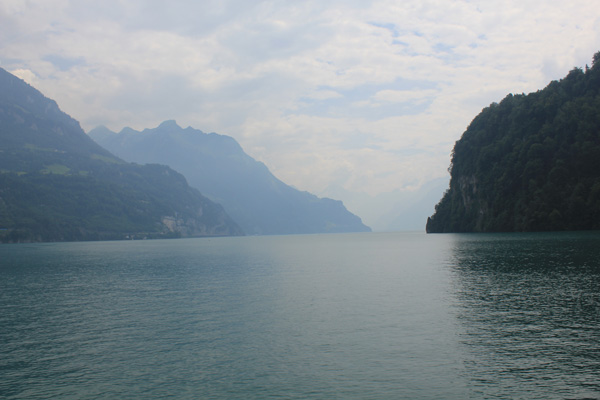
Lake Lucerne, one of the prettiest lakes we've ever seen.
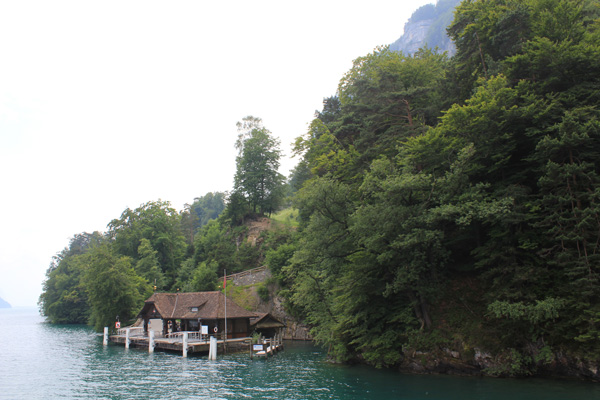
The approach to Rutli Meadow.
Lake Lucerne was where Switzerland came alive. The blue waters gave way to green slopes, then rocky cliffs, then snow-capped peaks. The shores were dotted with clean, neutral-looking towns, where homes had the look of gingerbread chalets and modest churches invited those of understated faith. Paddle-wheel steamers crossed the wakes of sailboats, gliding along to satisfy schedules as worn and smooth as the valleys left by the glaciers.
They disembarked at Rutli Meadow, to observe a civic legend. In 1291, the leaders of three Swiss cantons met in secret, to gripe about the Habsburgs. Open fields are generally not the best for clandestine meetings, but the mountains and waters shielded this particular meadow from the prying eyes of pseudo-Germanic overlords. The Swiss Confederation was thus born. The confederation had honored this with benches and signs, so that schoolchildren might have places to sit and things to read when taken to an otherwise unimproved field. Being American, the travelers were accustomed to bolder half-true origin stories. But it was a lovely meadow, which took little understanding of the past to enjoy. So they enjoyed it.
A steamer shuttled them to the opposite shore and a greater legend. Willem Tell, a strapping icon of the 14th century, also chafed at Habsburg rule. For his refusal to bow, he was arrested by a cruel nobleman. He was offered a reprieve, if he could shoot an apple off his son's head using his crossbow. Though he succeeded, he advised the nobleman that had he failed, the next bolt would have murdered said nobleman. This was not well received -- discretion is the better part of valor -- and Tell was imprisoned again. But while being transported to his fate -- via boat, on Lake Lucerne, alongside the nobleman -- a great storm arose. As Tell was a respected pilot, his captors unchained him. He steered the boat into danger, then leapt overboard to the shore. The nobleman and his party died.
The Swiss built a modest chapel at the site of Tell's fabulous leap, complete with painted illustrations of the deed. Some nations are born in glorious battle. The Swiss spirit was forged on a botched prison transfer and aquatic homicide. He found this endlessly entertaining. She smiled and admired the views. And few people were there to share the moment. There had been a crowd at Rutli, but only the hardiest travelers with the most thorough guidebooks found their way to Tellskapelle.
And so the travelers found themselves, for the first time, alone in Switzerland. As their fellow travelers drifted back to the dock, a decision presented itself. Their day needed to end in Zurich. They hoped to catch the evening train from Lucerne to get there. And they hoped the ferry would take them to Lucerne.
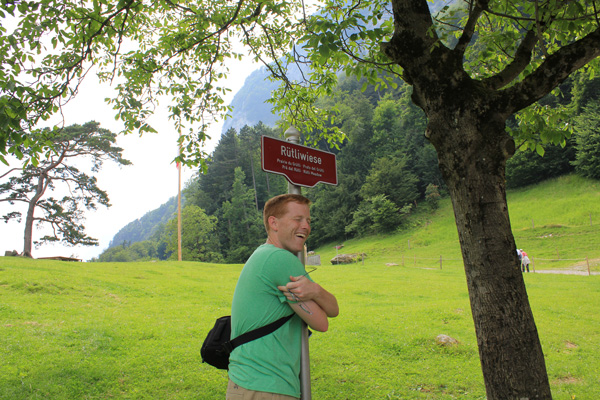
Visiting the birthplace of Switzerland, in Rutli Meadow.
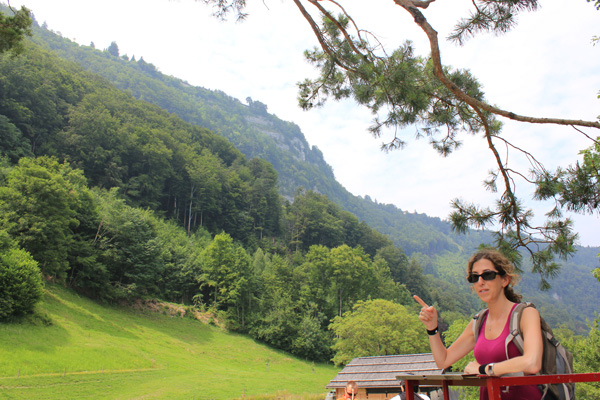
Re-enacting the formation of the Swiss state.
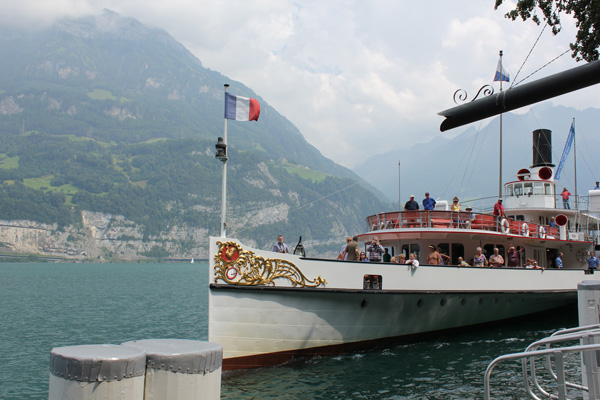
One of the old-school ferries in service on Lake Lucerne.
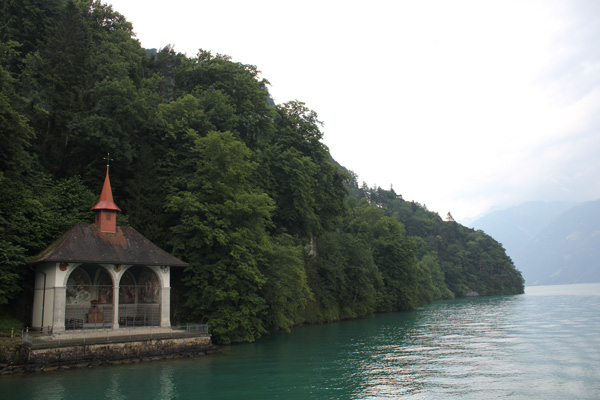
Tellskapelle, as seen from the deck of a ferry.
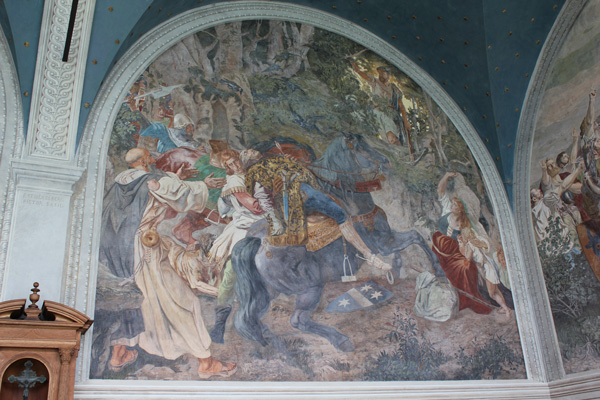
One of the large paintings of Tellskapelle, telling the story of Willem.
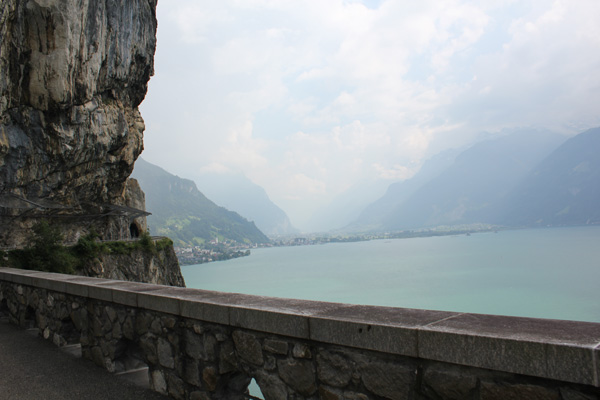
Strolling along the Swiss Path.
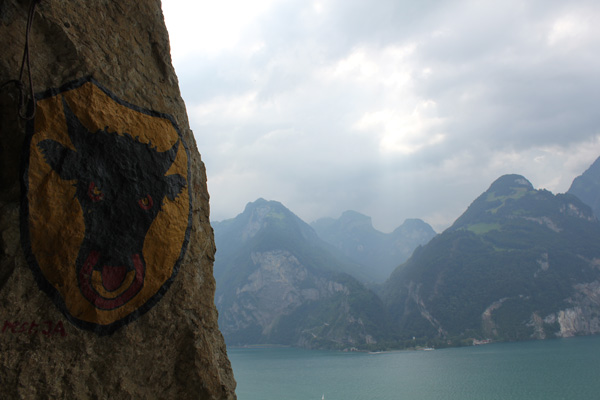
The emblem of a Swiss canton, painted on the rocks along the Swiss Path.
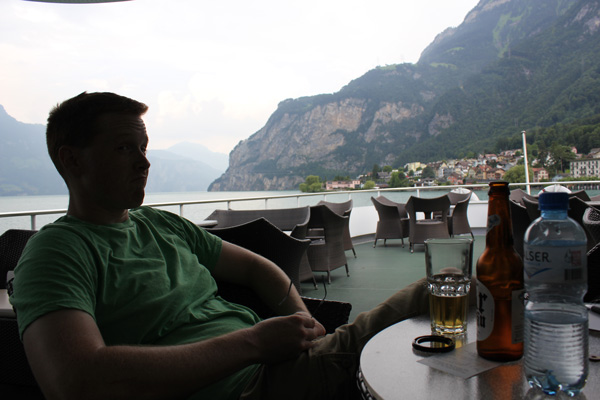
After running to catch a ferry, a hard-earned beer.
The problem before them was reaching the ferry. They could wait at the chapel and place their faith in Switzerland. The next ferry would arrive on time, to take them to the train, to take them to Zurich. Or they could walk to Fluelen. The shores of Lake Lucerne were ringed by the "Swiss Path," a trail that promised stunning views and the appropriate amount of sweating. Their trusted guidebook and the nearby signs promised a one-hour trek to Fluelen. Leaving the chapel at 3:45, they could meet the ferry there before it departed at 5.
She was not a hiker. Her back was weak, with a glacial curve of its own. Strength of spirt carried her through most days, but she was not built for the mountains. Truthfully, he was not a hiker either. But he aspired to be. Mountains were made for hiking, and Switzerland was mostly mountains. It seemed a terrible waste of a visit not to hike.
The path before them was paved. It mostly went through the mountains, and not up them. The scenery did seem exquisitely Swiss. The next hour was a gift she could give to him, if he carried their bag, and tamped down his enthusiasm a bit, and understood that it was in fact a wonderful gesture on her part, and agreed to turn back if they needed to. The terms were acceptable, so they set out.
The travelers climbed stairs and shadowed train tracks. They stumbled on a carillon, and clumps of flowers, and countless lookouts. They walked along cliffs, and through tunnels, and past the tops of the trees growing below. They heard distant thunder roll through the valley as clouds crept in from the north, and they saw beams of sunlight pierce those clouds to strike the lake below. The lake stretched before them and behind them, with the southern terminus just out of sight.
They also saw signs sharing the distance to Fluelen. The guidebook and simple math had told them that their goal was easily achievable. But as the signs were cross-referenced with a watch, the travelers realized a failing in either the guidebook or themselves. They considered throwing the blame on simple math, but it would have been an un-Swiss thing to do. As the specks on the lake blossomed into southward-bound ferries, they realized with increasing alarm that Switzerland had become a terrible enemy. This was no longer a time to think of spines, or hiking, or scenery. This was only a race to beat an unflappable foe: a Swiss timetable.
They walked faster, with the town finally appearing as the path sloped to the shore. But the clouds and spitting rain matched their pace, as did the boat that almost certainly had to be theirs. Panic set in with two kilometers to go. "I can run," she said.
She never ran. Her spine and habits did not allow it. She never took to jogging, or speedwalking, or any pace that might cause heavy breathing. But it could be her leap -- heroism, nurtured by the storms of Lake Lucerne. He kept pace with her by walking just slightly faster, but the thought did count. They reached the dock at 4:55, sweating and tired, thanking the spirit of Willem Tell. The boat, naturally, left a few minutes late, and the crew could not understand why the rumpled Americans were laughing so hard over drinks in the first class lounge. The threatening storm delivered little rain and left behind a rainbow. Their first stop on the ride home was Tellskapelle.
The ferry returned them to Lucerne, and the 8:10 train returned them to Zurich. The remains of the festival were mostly gone, revealing the city of their expectations just as they were preparing to leave. The travelers did not regret this at all. They had neither the time nor the inclination.
